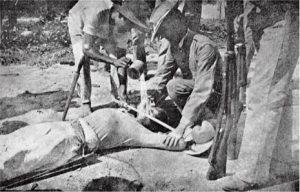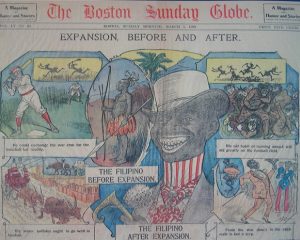Render your verdict on four early U.S. wars. Retweet
By Perry Willis
Randolph Bourne claimed that “War is the health of the state.” If true, then state schools have a natural incentive to teach historical myths that promote war. This article is the start of a series designed to debunk those myths. I hope to persuade you of 3 points…
- Our “patriotic holidays” need to honor soldiers without mischaracterizing U.S. wars.
- The claim that U.S. soldiers “defended our freedom” is sweet-sounding but false. Freedom may be what our soldiers wanted to defend, but that’s not how our politicians actually used them.
- We must curtail the future ability of politicians to aggress against foreign countries.
Please also remember this crucial point — I’m not blaming America for anything, but I am blaming U.S. politicians for lots of things.
Ask yourself the following questions about each intervention…
- Was it necessary to defend America?
- Did it protect or harm freedom?
- Did it make the world better or worse?
We’ll begin by reviewing four US wars from the 19th Century…
- The War of 1812
- The Mexican War
- The Spanish American War
- The Philippines War
Were early US wars good or bad?
Our view: Only three early US wars had anything to do with freedom — the American Revolution, the Civil War, and (very) arguably, the war against the Barbary Pirates.* Every other war was NOT about freedom or national defense, but about conquest and subjugation.
Here’s the evidence…
The War of 1812 (1812 to 1815)
After researching and writing books about Thomas Paine and Thomas Jefferson, the late Christopher Hitchens was asked what would most surprise Jefferson about the modern U.S. His answer was shocking…
Hitchens thought that Jefferson would be stunned to learn that Canada had not been absorbed into the United States. This implies that the conquest of Canada was an important goal for politicians like Thomas Jefferson. I will show how the War of 1812 provides evidence for that assertion. Alas…
The “comic book” history I learned in my statist high school told a different story about the War of 1812. I was taught they we went to war because of (in this order)…
- The impressment of U.S. sailors to serve on British ships.
- British interference with U.S. trade in the name of fighting Napoleon.
These were indeed issues in that war, but…
- The impressment matter was largely a red-herring designed to manipulate public emotions. Pretty much all countries impressed sailors, before and after the war, and even into the 20th Century. (See the term shanghaiing; See also point number two in this Smithsonian article for further demolition of the impressment theory.)
- What really made the trade issue compelling is that it carried with it the possibility of conquering Canada. The U.S. could occupy Canada to win trade concessions from the British and/or make Canada a part of the United States.
Two other issues were not at stake in the War of 1812…
- There was never any possibility that the British would attempt to reconquer the U.S.
- There was never any danger that the American people would lose their freedom.
So the War of 1812 cannot be said to have defended America or American freedom.
Instead, it was partially a war to defend the trading rights of wealthy shippers (much like the Barbary Pirates war), but mostly it was about potentially conquering Canada. Alas, we were repulsed from Canada. Our nation also got its capitol burned down as revenge for having burned York, the capitol of Ontario. In other words…
The War of 1812 was not a good war. But the next U.S. foreign war was even worse…
The Aggression against Mexico (1846 to 1848)
There’s no way to sugarcoat this — the war against Mexico was an act of criminal aggression aimed at conquest. Ulysses S. Grant was part of the force that provoked this war, and he described how it was done in his memoirs…
- The U.S. made a land claim adjacent to Texas to provoke a dispute with Mexico.
- President Polk then sent troops into the claimed area to incite a Mexican attack against U.S. forces.
- This served as the pretext for an invasion of Mexico, with the aim of winning large land concessions.
The “comic book” history I learned in statist schools didn’t really make a point of the criminal aggression or the fact that it was a war of conquest. The focus was placed on the loot the U.S. gained from the war — land that became the future states of New Mexico, Nevada, Utah, Arizona, and California. Of course…
Many Americans excuse the war for that reason.
Would we really prefer to not have those states in our country? Of course not. But there was a moral way to achieve the same result without war. U.S. politicians bought…
- Louisiana Territory from Napoleon when he needed money
- Alaska from the Russian Czar when he needed money
- The Gadsden Purchase from Mexico’s Santa Ana when he needed money
The same could’ve been done with the lands President Polk conquered in 1848. Our politicians simply needed to wait for a bankrupt dictator to take power in Mexico.
Certainly, this U.S. aggression against Mexico was not needed to…
- Defend America
- Defend freedom
U.S. politicians are racking up a bad record so far. We’ve looked at two wars, and both were about conquest, not freedom or national defense. But it’s about to get even worse…
The Spanish-American War (1898)
The politicians definitely sold this one as being a war for freedom. The war was supposed to free Spanish colonies (Cuba Libre!). In reality, its purpose was to conquer an overseas empire for the United States. This is demonstrated by the results…
- Cuba was indeed given its “freedom,” though it remained under heavy U.S. influence until the Castro revolution in 1959.
- But Puerto Rico, Guam, and the Philippines were absorbed as U.S. colonies.
Spain was falsely accused of blowing up The Maine, a U.S. battleship that was docked in Havana Harbor (it should not have been there in the first place), but at no point was the U.S. threatened or attacked by Spain. Thus…
The Spanish-American War was not about defending freedom or national security. It was about conquest.
U.S. politicians are batting a thousand so far. We’ve reviewed three wars. All were about conquest. None were about national defense or defending freedom. And the sequel to the Spanish-American War was even worse…
The Philippines War (1899 to 1902)
This one was pure evil. First, we promised to liberate Spanish colonies.Then we decided to keep some of those colonies as our own, including the Philippines. The Filipinos patriotically resisted. We waged war to subjugate them. During this war…
- American soldiers were ordered, by their officers, to torture and rape

- Villages were destroyed
- Civilians were thrown into concentration camps
- Roughly 250,000 Filipinos were murdered
Many of the pictures from this war look like something from the Holocaust. These crimes defended neither America nor freedom. Instead, they are a source of shame. They also set a bad example that would later be emulated by the Japanese.
That completes the record of the primary U.S. wars of the 19th century…
- None were about defending the country
- None were about defending freedom
- All were about conquest
- All made the world worse, not better
None of these wars can be used to justify claims that U.S. soldiers fought or died for freedom or national security. Instead, U.S. politicians used American soldiers to commit massive crimes. This is the brutal truth. And it’s the first pile of evidence for our three main claims…
- Our “patriotic holidays” need to honor soldiers without mischaracterizing U.S. wars.
- The claim that U.S. soldiers “defended our freedom” is sweet-sounding but false. Freedom may be what some U.S. soldiers wanted to defend, but that’s not how our politicians actually used them.
- We must curtail the future ability of politicians to aggress against foreign countries.
We’ll continue with the wars of the 20th Century starting with the next article in this series. In the meantime, if you want to learn more about the wars discussed in this essay, I recommend the following books. I’ve read all of them, and they informed this article…
- A Wicked War by Amy S. Greenberg
- The Politics of War by Walter Karp
- The War Lovers by Evan Thomas
- Honor in the Dust by Gregg Jones
- The Imperial Cruise by James Bradley
Perry Willis
Downsize DC


